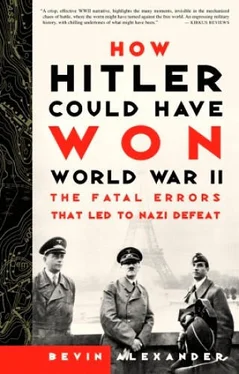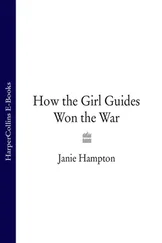The Canadian attack, made with two armored brigades, followed by infantry in armored personnel carriers (APCs), advanced three miles during the darkness, and by dawn August 8 had passed through the German lines. But here the advance came to a halt, though the way to Falaise lay open.
To get the attack started again, General Guy Simonds, 2nd Canadian Corps commander, brought forward his two armored divisions, one Canadian, the other Polish, and ordered them to advance on a narrow front to Falaise. The two divisions were inexperienced and were distracted by Allied bombers that dropped bombs short, killing 65, wounding 250. Meanwhile the Germans recovered, rebuilt a defensive line, and barred the way. The effort pushed forward a few miles, but collapsed on August 10—though the Allies had 600 tanks against 60 German tanks and tank destroyers. George Kitching, commander of the Canadian division (the 4th), blamed the Poles, who, he said, scarcely moved.
Adolf Hitler, having lost confidence in Kluge, was directing the battles from his headquarters in East Prussia. On August 9 he ordered tanks and antitank guns from the Pas de Calais to Falaise. This, he figured, would take care of the Canadian threat. Next he turned to the effort to capture Avranches. He wanted another attack, this time by six panzer divisions, while two other divisions were to bolster them.
German commanders called Hitler’s order “pure utopia.” Kluge could muster only 120 tanks at Mortain, half those in a single American armored division.
Because of Hitler’s insistence, the German army remained fixed from Mortain on the west to the front facing the Canadians on the east. Conditions were ripe for a colossal encirclement and caldron battle. Haislip’s troops were about to seize Le Mans. They then would be only seventy-five miles from the Paris-Orléans gap. Patton tried to convince Bradley to let Haislip go all out for the gap, and carry out his plan to liberate Paris and drive down the right bank of the Seine, surrounding all Germans west of the river. If successful—and there were few Germans to stop it—Patton’s plan would end Germany’s capacity to resist in the west in a matter of days.
But Bradley did not have the vision of Patton. And he was unwilling to take chances. He saw a lesser opportunity, with lesser potential gains. At Le Mans, Haislip was to turn north toward Alençon and Sées, and link up with the Canadians coming down through Falaise and Argentan— thereby cutting off the Germans to the west. This move might not destroy all the Germans in Normandy but it could dispose of many.
Haislip captured Le Mans on August 8 and prepared to move north. He had received two new divisions, a green American infantry outfit (80th) that was to guard the town, and the French 2nd Armored Division, whose commander, Jacques Leclerc, was primarily interested in liberating Paris. But he snapped up Patton’s offer to take part in the drive toward Argentan alongside the U.S. 5th Armored Division under Lunsford Oliver.
These two armored divisions, followed by two infantry divisions (79th and 90th), advanced halfway to Alençon on August 10, meeting virtually no resistance. On Haislip’s left, however, there was a wide gap with no American forces—since Bradley did not want to move troops into it while the Germans still threatened around Mortain. This void offered an opportunity for a German counterattack into Haislip’s flank.
Early on August 11, Kluge determined to pull back from Mortain and strike this flank. He had inflicted 4,000 casualties on the Americans, but had lost many men of his own and a hundred tanks. Hitler approved, and Kluge drew his troops away from Mortain.
Meanwhile Haislip reached the outskirts of Alençon on August 11 and designated Argentan, twenty-three miles north by road, as the next objective. Argentan was eight miles inside the British-Canadian sector, but that seemed no problem.
Early on August 12 Leclerc’s armored division captured Alençon, while Oliver’s 5th U.S. Armored Division pushed ahead to Sées, twelve miles along the road to Argentan. Ahead Argentan was defended only by a German bakery company, which was digging in at the southern edge of town.
Oliver’s American tanks could have rushed down the Alençon-Argentan highway and seized the town quickly, except that Leclerc, in defiance of orders, usurped the road for some of his own troops. When the Americans finally got to Argentan, it no longer was guarded by bakers but by three panzer divisions and at least seventy tanks, moved over by Kluge from Mortain.
Kluge’s intended strike against Haislip’s flank never came off because the Germans lost stocks of gasoline and other supplies near Alençon, but the panzers’ possession of Argentan left open an important east-west highway. If the Germans lost Falaise and Argentan, only a narrow thirteen-mile gap without good roads would remain.
Haislip informed Patton on the evening of August 12 that he intended to strike at Argentan the next morning. But he pointed out that the farther he advanced the more extended he became, with few troops guarding his flank. If he captured Argentan, he was certain to stir up a fierce German response. Should he go on or not?
Patton opted for audacity. In a letter to his wife, Patton quoted Napoleon: “L’audace, l’audace, toujours l’audace.” The game was worth the candle. After taking Argentan, Patton told Haislip, proceed to Falaise, make contact with the Canadians, and close the pocket.
But when Patton informed Bradley, he told Patton: “Nothing doing. You are not to go beyond Argentan.”
Bradley’s reasons were in part that Haislip’s corps was strung out on a forty-mile line, and that Lawton Collins’s 7th Corps, which he had ordered to shore up Haislip’s left, could not arrive for a couple days.
But Bradley’s principal aim was to avoid offending his Allies.
“Falaise was a long-sought British objective,” he wrote, “and, for them, a matter of immense prestige. If Patton’s patrols grabbed Falaise, it would be an arrogant slap in the face at a time when we clearly needed to build confidence in the Canadian army.”
Montgomery instructed his chief of staff, Francis de Guingand, to “tell Bradley they [Haislip’s corps] ought to go back.” De Guingand wrote after the war that if Montgomery had invited the Americans to cross the army group boundary, they would have closed the Germans in a trap. But Bradley and Eisenhower didn’t ask, either.
As Haislip reached the edge of Argentan, Germans reinforced the shoulders there and at Falaise, and nonessential elements began escaping through the gap. The field divisions were still in the pocket.
Montgomery ordered the Canadians to push on and take Falaise on August 14. But the effort got nowhere. To assist, he directed Dempsey’s British 2nd Army to attack at the same time from the northwest—a move Bradley and Eisenhower likened to squeezing a tube of toothpaste from the bottom with no cap on. The effect could only press the Germans out of the pocket, not hem them inside where they could be destroyed.
Meanwhile, Bradley planned a new turning movement to block the Germans who had already escaped. He ordered an advance by 3rd Army to the northeast—Haislip’s 15th Corps (cut to two divisions) to Dreux, fifty miles west of Paris; Walton Walker’s 20th Corps to Chartres, fifty miles southwest of Paris; and Gilbert R. Cook’s 12th Corps to Orléans, seventy miles south of Paris. The idea was to wheel around the supposedly retreating Germans. The operation got under way on August 14.
Bradley’s shifting of Patton’s entire army away from the pocket weakened the Argentan shoulder and made it easier for the Germans to keep the gap open. Bradley recognized his error on August 15, and he rushed to Patton’s headquarters to call off the wheeling movement. But it was too late. Patton’s three corps were almost at their destinations. Even so, on Bradley’s orders, Patton stopped at the three cities.
Читать дальше


![Джонатан Димблби - Barbarossa - How Hitler Lost the War [calibre]](/books/385421/dzhonatan-dimblbi-barbarossa-how-hitler-lost-the-w-thumb.webp)









